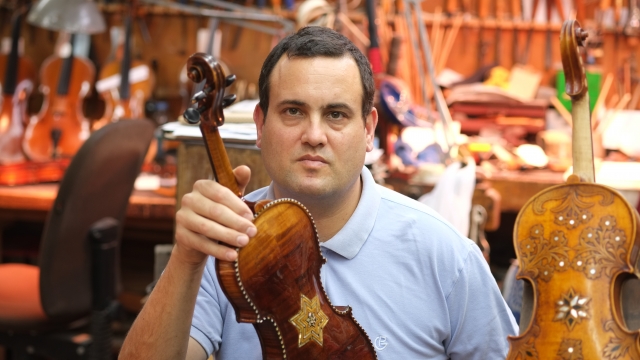They say great music is timeless.
At a concert Thursday in a Chicago-area synagogue, it's the instruments — specifically the violins — that carried decades of history and profound symbolism.
They once belonged to Jewish musicians before and during the Holocaust.
"The violin was something which was very much seen as a Jewish instrument," explained Avshalom Weinstein, the co-founder of the of Violins of Hope project and a third-generation violin-maker.
In workshops in Turkey and Israel, Weinstein and his father, Amnon, have spent the last 20 years lovingly collecting and repairing Holocaust-era violins. Many were played inside concentration camps where prisoners were often forced to entertain Nazis.
"Playing the music helped them survive, help them keep sane, helped others who heard it sometimes keep sane," Weinstein said.
Other retrieved instruments were thrown out from trains bound for Auschwitz and other death camps.
"It's amazing. I mean, there were so many different stories and will never know all of them," he continued.
For Weinstein, it's personal. His grandparents lost hundreds of family members and friends to the Holocaust. Still, after the war, his grandfather in Israel started acquiring what no one wanted: Violins made in Germany.
"For him, to destroy an instrument was not the right way. He thought and believed that the instruments, they didn't harm," he said. Today, the collection has grown to over 100 string instruments. Six of them were exhibited with heart-wrenching information about their origin stories at the North Shore Congregation Israel in Glencoe, Illinois, in a room leading to the sanctuary where the concert took place.
SEE MORE: Artificial intelligence keeps the memory of Holocaust survivors alive
Among the 700 concertgoers were many families with their own Holocaust survival stories.
Anita Cukier, whose parents survived Auschwitz, says the packed event fills her with hope.
"Every time I come to a synagogue, I am so grateful that I am alive and that I can be part of the Jewish community and see that it's thriving and it's being accepted even in an area like this that used to be forbidden to Jews. It's wonderful," she said.
The concert itself featured 16 violins from Weinstein's collection. Violinist Julian Rhee played one of them at a private reception ahead of the performance and later told Scripps News he was beyond honored to be a part of the Holocaust remembrance project.
"To bring a very visceral feeling to something that we need to remember and that needs to stay very powerfully inside all of us, I think it's incredible. And it's kind of an honor that what I'm doing as a violinist can play a role in that," said Rhee.
Over the past 20 years, the violins have traveled the globe for exhibitions and performances on the world's biggest stages. But their stop in Chicagoland is the most ambitious to date.
For the next six months, 70 instruments will be showcased in more than 100 events across Illinois — including in schools and communities with very few Jewish people.
"One of the most heartwarming parts of this initiative is how many people across a diverse spectrum of individuals and organizations and groups have raised their hand to really talk about tolerance and acceptance and kindness and hope," said Addie Goodman, the president and CEO of JCC Chicago, which is sponsoring the initiative.
With each concert, the memories and individualities of the six million Jewish people who perished during World War II come back to life. And in the audience, people can take comfort in the powerful knowledge that harmony, humanity and hope prevailed.
Trending stories at Scrippsnews.com



